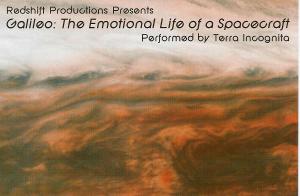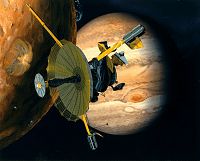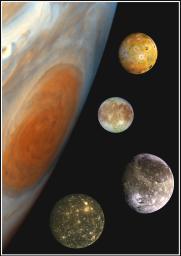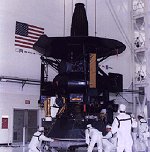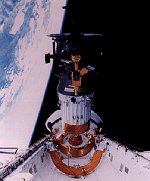|
January
23, 2003
A
Conversation* with Megan Halpern & Max Evjen * via email
HS:
Please
tell me something about yourselves, your musical backgrounds and your
interest in space. MH: I began my career as a scenic designer and artist, my degree is in painting. I had a casual interest in science, astronomy and cosmology, but only to the degree that I read A Brief History of Time on the subway about five years ago. I knew that I wanted a performance company, and at the time we were focusing on developing the collaborative art form (this is still a large part of our mission). When I began to work with Max, and he suggested the name for our company, Redshift Productions, this simple idea rekindled an interest in the sciences for me. I began to research the redshift, as well other scientific concepts and I realized that these were the things that really inspired me. So the name really defined the focus of our company. ME: I moved to New York City to work primarily in theater, as an actor and technician. My musical experience spans about 12 years at this point. I started by playing guitar and writing music for a band while in high school and moved on to playing bass about three years later. I spent my first two years in New York playing guitar and bass for Lauren Pellegrino. During that time I lent my guitar skills to a show I was acting in called Trail of Tears at Theater for the New City. It is very hard to gauge when my interest in space actually began, but I became increasingly interested in cosmology just before coming to the city. The concept of redshift had piqued my interest in terms of applying it to an artistic setting for many years. When Megan and I began to work together it became increasingly clear to me that the nature of our work would fit that concept perfectly. And that set the focus of our company toward cosmology.
ME: I was also unaware of Filk, but I do agree that Galileo will be of great interest to all who listen to and write Filk. HS: Yes, I think Filk audiences would love what you are doing. Another space music venue that you might look into is the annual Yuri's Night celebration. There are parties around the world every April 12th to commemorate the anniversary of Yuri Gagarin's and humanity's first flight into space in 1961 and to celebrate space exploration in general. HS: What attracted you in particular to the story of the Galileo spacecraft? MH: First we were inspired by Jupiter. Coming off of Elements, the idea of the four elements was fresh in our minds. Jupiter and three of its moons are connected in what is called the LaPlace Resonance, which was very interesting to us. Jupiter, being a gas giant, we saw as Air, Io as fire, Europa as water, and Ganymede as earth. As we researched the system, which is almost as complex as our solar system, we wanted to incorporate more than just the four bodies that are part of the LaPlace Resonance. Galileo became a wonderful way to explore the Jovian system in the first person. Beyond that, the spaceship itself became a character to us, and the show was transformed. ME: After Elements I began reading Mission Jupiter by Daniel Fischer which tells the story of the Galileo Mission, as well as some background about all of the previous unmanned space missions. I found the story to be quite compelling, and we realized that if we set that story in a human experience it would be very dramatic as well. MH: I have so much to say about this, I will try to keep it brief. This really gets to the heart of what we are trying to do with Redshift Productions. These are adventures not only for the spacecraft, but for those who dreamed it, built it, and control it from earth. We are doing all we can (reaching out to JPL, the Planetary Society, etc.) to remain true to their emotions. The history of the ship itself is fraught with drama as well (For example, the delay and redesign due to the Challenger, the high gain antenna failure, and the extra exploration they were able to do by saving energy from the slingshots). I think that the images that came back from Galileo are so beautiful, so inspiring, and so mysterious, that they are begging for a way to be seen. The idea that you can look up in the sky and see a tiny dot of light and know that we have an ambassador there, circling that dot is profound and real to me. I hope it is to my audience, too. Beyond that, we are really asking the question "why." Why do we send ships into space? What do we hope we might learn? These large missions have now all been cut from the NASA budget, and not many people see the reason for spending billions of dollars to find out what is happening billions of miles away. We do, and we want to share our thoughts. I think the spirit of the explorer has always been tempered the by spirit of the conqueror. These missions are not romanticized as our missions to the moon back in the sixties were. I think that has less to do with whether or not these are manned missions and more to do with "spin." I think there was a need to excite people about space exploration during the cold war, when there was something at stake, but now, any exploration we undertake is pure exploration, and seems to be less of an immediate need (though China might change that eventually).
HS: Elaine Walker, along with her ZIA group, is known for using her music to promote space exploration and development, especially with regard to the establishment of communities in space. Would you also characterize yourselves as space activists? If so, how do you see the role of music and the arts in motivating and participating in humanity's move into space? MH: I would characterize us as science activists. I see the arts as the missing piece of the puzzle in science's search for truth. We have a da Vinci quote on our website, "Art is the Queen of all sciences communicating knowledge to all the generations of the world." I would like to see the scientific community embrace us as their partner in illuminating the public. Support for the sciences, support for humanity's move into space, will come when people have more than a surface understanding of the concepts. It will come when they feel the ideas. ME: Our focus is certainly more in the direction of providing a different understanding of scientific concepts so people can take the information and make decisions based upon what they feel and know. But I do admit that in addressing this subject, we shift the focus of our audience outward into space, and in that regard we may be something akin to space activists. The difference is that we don't stop there. We hold great interest in many different scientific concepts, and future projects will involve those concepts.
HS: One of my biggest rewards in creating HobbySpace has been the discovery of so much space inspired music. When I first started that section I thought I would list Elton John's "Rocketman" and David Bowie's "Space Oddity" and a few other such space hits and that would be it. Instead, Space Music has become one of my largest sections. I seem to come across whole new genres all the time such as space music of the 40's and 50's, planetarium music, and Filk. Sure, much of it is metaphorical, such as with New Age "Space Music", but that still implies that just the mere [suggestion] of "outer" space triggers something inside us. What do you think are some of the reasons that space appeals to the musical imagination and creativity? MH: This is a great question. Astronomy, astrophysics, cosmology, these are the "sexy" sciences. I think there are so many reasons why, and yet there is still something indescribable about the lure of space. There is a potent combination of beauty and mystery surrounding the cosmos. It is so vast, so much bigger than us and we all have a fundamental hope that we are a part of something larger than ourselves, and that we belong. Ultimately, I don't think we can know who we are unless we understand our place in the cosmos. ME: Music is a constant play between structure and chaos, and our understanding of the universe is very much the same. That makes it a perfect medium to describe space. Also, music can be observed directly, but to study it you must record it. Our understanding of space comes largely from observable data. The processes that play out in our observable universe are very far away, and music gives us the opportunity to carry out those processes to be observed very closely. We can feel it in our "souls." It makes us dance, it makes us sing. Through music we can share in the life of space right here on Earth. HS: On the other hand, there has been a strong anti-tech undercurrent to rock music, and the arts communities in general, ever since the counterculture days of the late 60s. There have not been a lot of "Rocketman" type hit songs in the past 30 years! MH: I think that will change. In terms of technology, I see us as teenagers with a new right/responsibility that we are not quite yet able to handle. A huge reason for that is our inability thus far to connect technology with spirituality. There are many factors, not the least of which is the Internet, that are changing that. Technology is becoming so pervasive, and so much more intuitive, that it is being embraced. My mother can use her computer, but I have a relationship with mine. My 13 year old cousin can program his. Have you heard Moby's song We are all Made of Stars? HS: Yes, I really like that song. In fact, it was one of my Space Songs of the Month (fortunately, he has an on line video.) ME: I agree. The U.S. space program was set in motion in the name of competition during the cold war. More recently, we have experienced a spirit of cooperation in the name of science that has kept the space program moving. We have shied away from asking "Who can go there first?" Instead we have been asking "How can we get there together?" I think there is already a movement toward music whose subject matter embraces technology, but an even larger one is well established that utilizes high technology as the source of instrumentation. The very name "electronica" expresses a style of music that uses technology as its basis for expression. Many more musicians are less and less afraid of technology, because it increases our ability to express artistic concepts more accurately. In turn, that makes us all more accepting of technological concepts. .
ME: A lot of other artists and musicians are conditioned not to accept concepts as valid when they are outside of their personal experience. The same holds true for people of many different professions. Some people even become hostile toward the subject. It seems as though some people think we want to change their minds. We just want people to ask questions. If they want they can change their own minds on their terms. Yet more and more people are becoming interested in and excited about this work. For them, there is a world of possibility they may not have realized before. Showing people the way to that is what our job is about. It is very exciting to us. HS: I can very easily imagine the blank stare reaction. It reminds me of some of the [initial] responses to 2001: A Space Odyssey ( in which Jupiter also played a big part!) It received a lot of negative reviews [when it first came out, most] of which were truly ridiculous. Many intellectuals who would normally love its very unique and heavily metaphorical approach were obviously dumfounded by the space exploration context. It's as if they banged into the limits of their imagination and fell back dazed, wounded and very annoyed! 2001 was nevertheless a success and is, in my totally biased opinion, more than just a great movie but one of the greatest works of art of our time because, just as you seek to do, it got lots of "people to ask questions", especially the BIG questions - What is our significance within the enormity of time and space? Who, or what, is out there? Can our sense of individuality and uniqueness survive the creation of artificial intelligence and an encounter with an alien intelligence? The characters in 2001 were deliberately generic, though. As you say, most artists today concentrate solely on personal experience and that's what audiences expect. I think by giving the Galileo spacecraft an inner life, you provide the listener a way to empathize and identify with the main actor in the story and avoid the abstraction and coldness that many works about space exploration can present. MH: Exactly. 2001 is really hailed as one of the greatest movies of all time by so many people now. I myself am partial to 2010 because I really want to see the discovery of life on Europa.
HS: Many in the public, especially young people, typically view real (as opposed to sci-fi) space exploration as something very abstract and dull and only done by crew-cut nerds at NASA and big aerospace companies. Can musical events such as yours help to alter that perception by depicting space exploration as actually a wildly exciting and cool adventure? MH: YES! The Galileo Mission IS wildly exciting, the images of the Jovian system are breathtaking, and the orbiter's journey was full of accomplishments as well as setbacks that make for high drama. For anything that can be made up in science fiction, we can find something equally bazaar, exciting, and cool in the world of science. Wormholes, black holes, life on Europa, planets just floating starless through space, even something as technical as Jupiter's magnetosphere and its effect on the earth (if you could see it, it would take up 1/3 of our night sky) are crazier than all but the most fantastic science fiction. And the most fantastic science fiction is based largely in science fact. ME: Absolutely. Not only can we alter that perception by depicting space exploration as wildly exciting and cool, we do! I believe that every person who attends our show will walk away with a very different and exciting idea of the very nature of space exploration. There is so much in the universe, and in our solar system alone, that could fill as many, if not more, volumes than is written about in science fiction. And the most fantastical thing about our universe is that it is real. Stars do collide, super-massive black holes do exist. We are on the brink of discovering real life outside of our planet. It may be something very different, but if it is similar to what we already know, it would be more profound to realize that we are connected by common form though many millions of miles away. HS: Thank you, Megan and Max and best of luck with Galileo and your future productions. MH: I'd like to end by giving you the lyrics to the Epilogue of the show, which sums up the entire journey.
|
|||||||||||||||||||||
